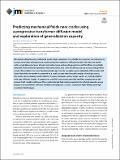Predicting mechanical fields near cracks using a progressive transformer diffusion model and exploration of generalization capacity
Author(s)
Buehler, Markus J.
Download43578_2023_Article_892.pdf (4.934Mb)
Publisher with Creative Commons License
Publisher with Creative Commons License
Creative Commons Attribution
Terms of use
Metadata
Show full item recordAbstract
Abstract
We report a deep learning method to predict high-resolution stress fields from material microstructures, using a novel class of progressive attention-based transformer diffusion models. We train the model with a small dataset of pairs of input microstructures and resulting atomic-level Von Mises stress fields obtained from molecular dynamics (MD) simulations, and show excellent capacity to accurately predict results. We conduct a series of computational experiments to explore generalizability of the model and show that while the model was trained on a small dataset that featured samples of multiple cracks, the model can accurately predict distinct fracture scenarios such as single cracks, or crack-like defects with very different shapes. A comparison with MD simulations provides excellent comparison to the ground truth results in all cases. The results indicate that exciting opportunities that lie ahead in using progressive transformer diffusion models in the physical sciences, to produce high-fidelity and high-resolution field images.
Graphical abstract
Date issued
2023-01-12Department
Massachusetts Institute of Technology. Laboratory for Atomistic and Molecular Mechanics; Massachusetts Institute of Technology. Center for Computational Science and EngineeringPublisher
Springer International Publishing
Citation
Buehler, Markus J. 2023. "Predicting mechanical fields near cracks using a progressive transformer diffusion model and exploration of generalization capacity."
Version: Final published version